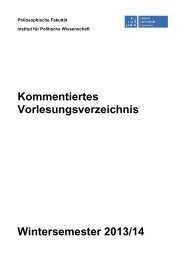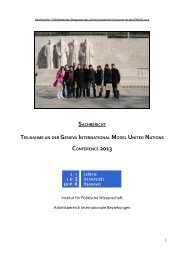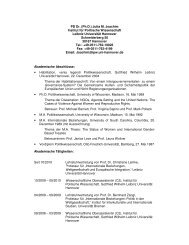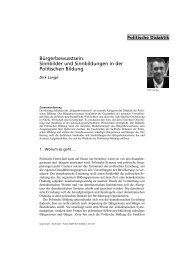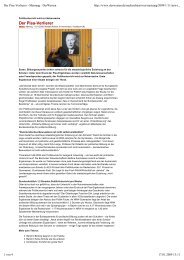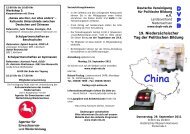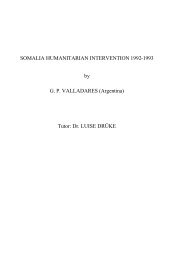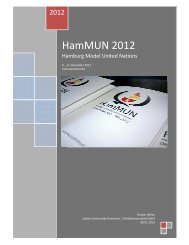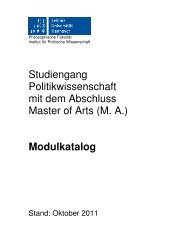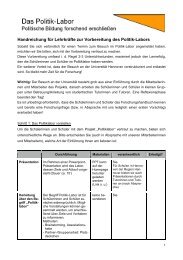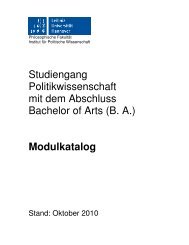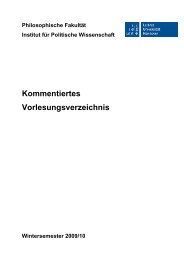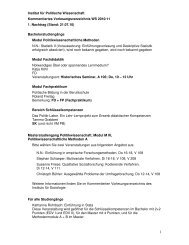Preventive Action for Refugee Producing Situations
Preventive Action for Refugee Producing Situations
Preventive Action for Refugee Producing Situations
You also want an ePaper? Increase the reach of your titles
YUMPU automatically turns print PDFs into web optimized ePapers that Google loves.
138 Chapters<br />
where they were held. They probably became a factor in helping the invading<br />
North Vietnamese Army ultimately to win.328<br />
The <strong>for</strong>ced resettlement of populations into strategic hamlets caused<br />
large-scale human suffering and was a threat to the lives and security of<br />
millions of civilians. It drove much of the population to sympathize with<br />
the enemy rather than to withdraw its support from them. The great majority<br />
of these <strong>for</strong>cibly relocated people did not support the government of<br />
Vietnam in the war and thereby contributed to losing it.329 On the<br />
contrary, a recent study shows that those who were <strong>for</strong>ced into strategic<br />
hamlets opened their gates to the Vietcong. Communist cadres and guerrillas<br />
moved freely in and out of the strategic hamlets and were given<br />
supplies and often Vietnamese government rations. Moreover, these relocated<br />
villagers provided intelligence to the Communists and withheld it<br />
from government troops. They did not actively work or fight against the<br />
enemy. Large-scale bombarding and military operations causing 'tactical'<br />
refugees, were mainly based on a Western military concept, and barely<br />
took into account the people concerned, their human needs and abilities.<br />
The result was great instability and turmoil.<br />
The potential role of the United Nations<br />
This sad chapter in Vietnam's history shows how easily people can become<br />
political pawns in the hands of those with power. This was not only<br />
true during the Vietnam War; it has been a reality be<strong>for</strong>e and ever since,<br />
and is likely to stay part of power politics <strong>for</strong> years to come.<br />
The aim of this section is to examine whether UN specialized expertise<br />
and experience might have been able to help prevent the massive<br />
displacement and uprooting of some of these people. The question is<br />
whether today, in a world tending toward an easing of relations between<br />
the major powers, and perhaps holding more possibilities <strong>for</strong> international<br />
law en<strong>for</strong>cement of human rights instruments and peaceful resolution of<br />
regional conflicts, the potentials exists <strong>for</strong> this tendency of using people<br />
<strong>for</strong> political purposes to abate. We suggest that today there may be more<br />
possibilities <strong>for</strong> protecting civilians from policies that actively seek to turn<br />
them into refugees.<br />
International human rights law has been extended into national jurisdiction,<br />
as indicated in Chapter 5. This justifies not only the U.N.'s legi-<br />
___________________________<br />
328 Wiesner, Victims and Survivors, (Draft), p. 601.<br />
329 Wiesner, Victims and Survivors, (Draft), p. 607.<br />
Analytical Discussion 139<br />
timate interest but also its action within states's borders to start seeking solutions<br />
to refugee problems where they arise. 330<br />
UNHCR assisted returning ethnic Vienamese expelled from Cambodia after<br />
1970. In 1974, in an extension of its activities that the General Assembly approved<br />
ex. post facto, it also helped Vietnamese displaced persons within their country. 331<br />
The U.N. might have been able to provide technical expertise and humanitarian<br />
assistance to Vietnam at an earlier point than 1974, when UNHCR initiated its<br />
programs <strong>for</strong> approximately 750,000 displaced persons within the country.<br />
Immediately following the Peace Agreement <strong>for</strong> Vietnam in 1973, UNHCR<br />
started to negotiate the first phase of its special operation <strong>for</strong> displaced and<br />
uprooted populations. 332 Dale De Haan, then Chief of Staff of Senator Edward<br />
Kennedy, had visited North Vietnam from 10 to 17 March 1973 to examine the<br />
need <strong>for</strong> and possible scope of international and U.N. relief ef<strong>for</strong>ts in Vietnam. 333<br />
During a second mission to Vietnam by Senator Kennedy's Office in July 1974,<br />
UNHCR initiated a special operation <strong>for</strong> "displaced and uprooted populations" in<br />
Vietnam 334 (and Laos) in response to requests from these<br />
________________________<br />
330 UN GA res. 41/124, 4 December 1986: The General Assembly "recognizes the<br />
importance of finding durable solutions to refugee problems and recognizes also that<br />
the search <strong>for</strong> durable solutions includes the need to address the causes of movements<br />
of refugees and asylum seekers from their countries of origin...."<br />
331 UN GA res. 3454 (XXX), 9 December 1975: Report of the UNHCR, in which the<br />
General Assembly <strong>for</strong> the first time mandated the UNHCR to undertake special<br />
humanitarian tasks reaffirming the eminently humanitarian character of the High<br />
Commissioner's Office "<strong>for</strong> the benefit of refugees and displaced persons" [emphasis<br />
added].<br />
332 U.S. Congress, Committee on the Judiciary, U.S. Senate, Aftermath of War: Humanitarian<br />
Problems of South East Asia, A Staff Report, Prepared <strong>for</strong> the Use of the<br />
Subcommittee to Investigate Problems Connected with refugees and Escapees, 94th<br />
Cong., 2nd sess., 17 May 1976 (Washington, D.C.: U.S. Govt. Printing Office, 1976),<br />
p. 9.<br />
333 The mission report is contained in U.S. Congress, Senate Committee on the Judiciary,<br />
Relief and Rehabilitation of War Victims in Indochina. Part III: North Vietnam<br />
and Laos: Hearing be<strong>for</strong>e the Subcommittee to Investigate Problems connected with<br />
<strong>Refugee</strong>s and Escapees, 93rd Cong., 1st sess., 1973, pp. 33-49. Hereinafter cited as<br />
1973 Kennedy Mission Report, as quoted in Kumin, "Orderly Departure from<br />
Vietnam: A Humanitarian Alternative?" (Ph.D. dissertation) The Hetcher School of<br />
Law and Diplomacy, 1987, p. 40, hereinafter cited as 1987 Kumin ODP Dissertation.<br />
334 In 1978, there were still 750,000 persons reported as displaced inside Vietnam,<br />
besides 350,000 refugees from Democratic Kampuchea. See International Migra-



